- Home
- Adam Thorpe
No Telling Page 2
No Telling Read online
Page 2
‘Leave it? Are you joking?’ my uncle replied. ‘Go back to the country, Papa.’ Gigi didn’t live in the country, it was a joke, it was because he was always going on about the days when Bagneux was a village with fields and gardens where the factories now were. The only bit of country left nearby, apart from a few huge vegetable gardens, was the big cemetery and the park at Sceaux with its trees and fountains. We’d walk around this park once or twice a year and keep wanting to walk around it much more often.
In fact, my uncle left the crazy paving on the wall of the house and nothing more was said. That was good because, apart from the crazy paving and the peeling pink porch, the house was just a dirty browny colour, with grey cement around the windows like Stone Age televisions. But it did feel weird, to have caused so much fuss with a lie.
As my uncle was smoothing the liquid cement, grunting away, his blue overalls and face splattered with grey, he told me that his real dream was to build a house of aluminium and glass. It would be like one of the new factories in Bagneux but much smaller: the light would stream in and we would feel modern.
‘Mention it in your prayers next time, chum. You never know.’
Yes, I could picture it easily. There was a photograph on the wall of my uncle’s office, in the front room facing the road, which I would stare at for ages. It said L’Institut Français des Pétroles at the bottom, and had been given to my father in 1959 because the building was cleaned with our vacuum cleaners. It was smooth and flat and blue with glass stripes that were windows and a lawn around it and trees on the lawn. A tiny red-haired woman in a short skirt, with white shoes and a white bag, stood with her legs wide apart in front of the building, staring back at me.
I would stare at this photograph even while my uncle sat at his desk. I would sit in the swivel chair where clients would normally sit and walk into this photograph of L’Institut Français des Pétroles until I wasn’t in the office any more. It was ages before I realised that two faults in the photograph, just bits of light getting in as they’d get in to my box camera, were in fact sprinklers shooting out their spray in white Vs and then falling onto the green lawn in a sort of mist.
This place was what Paradise was like, I thought: very calm and perfect. An American-style car was parked on the left, though you could only see its bonnet. You could see more trees reflected in the glass stripes that were windows, though you couldn’t see into the windows. Maybe there was no one inside the building. In fact, I reckoned the only person around was the woman with red hair and white shoes, so I called her Eve.
You couldn’t see into the showroom, either, unless you came up close to the glass.
My uncle worried about me from time to time. He’d wonder how I could sit there so still, staring at the wall. I’d just grunt and say that I was fine.
‘What’s on telly today?’ he’d joke. ‘Let me guess. The French Petroleum Institute. That’s a thrill a minute.’
He was always making jokes. Our real television took up one of the units in our sitting-room’s wall-to-wall cabinet. Next to the television was a door in the cabinet which swung down like a secret opening to become a bar, and above it were the open shelves with a short row of books and my mother’s collection of coloured glass animals and my father staring out over them. The priest at church had said that mankind was like a prisoner ‘on parole’, that God the Father was always watching us (like a spy, I thought). We could be let out, at the end, and go to Heaven, but only if we were without sin. My father was always watching me, too. By looking at him through the neck of the giraffe, I could even make him move his eyes.
Other doors in the wall-to-wall cabinet were locked, but however much I kept a watch on them they were never opened when I was around.
I was allowed to watch an hour of television a day. One afternoon, watching a variety show, I suddenly felt ill. I had a temperature, nausea, and an iron crown tightening around my head. This iron band grew tighter if I could see any light – even the tiniest chink.
I was eating too many eggs, the doctor said. Twice a day I had to take a heaped spoonful of green crystals which rustled in my mouth as I chewed and had the most disgusting taste possible.
I had another attack before three months had passed. Our new doctor pulled a face and called the attack a ‘migraine’.
‘Ah,’ my mother said, ‘my mother had migraines.’
‘It jumps a generation,’ the doctor said, and gave me some big white tablets that tasted dusty and reminded me of the Host – except that they didn’t stick to the roof of my mouth. He told my mother that I must ‘go carefully’ on oranges, cheese, chocolate and red wine – which made my uncle laugh.
When I felt a migraine sneaking up on me – about half an hour before the headache started – I took the tablets straightaway. Otherwise it was too late. Then I would have to lie in my darkened bedroom with a bucket next to me for two or three days feeling as if I had been dropped down a deep well or mineshaft head first. The one good thing was that, because it could be caused by anxiety, it sometimes came in useful with my parents.
It was soon after my second attack, when I was nearly ten, that my sister told me about my father’s death. We were playing vingt-et-un in the kitchen, and I said that we were playing it on the day my real Papa went away.
‘He didn’t go away,’ she said. ‘He died.’
‘I know. It was a boat.’
‘What?’
‘It sank.’
‘Gilles, he never left home. I found him in the showroom. He copped it in the showroom.’
I thought about this for a moment.
‘What did he look like when he was dead?’
‘Why do you want to know that, Gilles?’
‘Because.’
‘Are you sure?’
‘Yes.’
She told me how she had discovered him lying on the floor in the showroom near the fire extinguisher, his eyes wide open and his skin cold and his right hand holding the extendable tube of one of the heaviest Aspiron models, as if trying to pull it somewhere. His striped tie, she said, was over his shoulder, as if blown by a wind, and his teeth were showing as if he was about to smile – ‘for once’. She knelt by him and told him to get up, straightening his tie, smoothing it on his chest. She shook him, and got angry, and shouted at him to get up, but his body was heavy and even a little stiff, his head wobbling stupidly and his eyes staring at the ceiling. Then the room had gone dark, she said.
I never knew what happened after that; perhaps someone found my sister lying in a dead faint next to him – my mother, probably, come back from shopping. I never thought to ask, and now it’s too late. I just pictured myself being bundled off to my aunt’s, to her cold sheets and hard bolsters, and everybody feeling sorry for me there, as if it was me who had died.
‘Did he have a heart attack?’
‘No.’
‘Did someone shoot him?’
‘Don’t be stupid.’
‘What did he have then?’
‘He slipped.’
‘Slipped?’
‘That’s what they think. The floor was wet. He slipped and cracked open the back of his skull just at the point on the brain where it’s really bad to do that. It was a one-in-a-million chance.’
I didn’t say anything about me slipping over on the wet floor. I just thought how lucky I was not to die.
Carole went to the fac for a few weeks. Then she stopped. The university was in Nanterre, not far from us, and was so new, she told me, she had to hop through mud to get to her lessons. Her room was in a tall block and was like a box. You weren’t allowed to have your own furniture, the desk and bed were screwed in and it was forbidden to stick anything on the concrete walls.
‘It’s a factory,’ she said, one day, while she was at home for the weekend. We were sitting on a bench in the park on a grey winter morning. I’d asked her what a university was, exactly, and why she’d left it. She was wearing a big red scarf so long its tassels were muddy; she ke
pt wrapping it around her hand, like a bandage. ‘That’s all mine was. A fascist factory. You sit in a big type of theatre and someone stuffs you with facts so you turn into a cog in the universal machine. A mould for stupid robots.’
I tried to picture it, frowning.
‘Shit, we weren’t even supposed to have any meetings,’ she went on, rolling a cigarette, ‘not if they were religious, political or philosophical. You could just about play cards or watch TV in this one communal room with neon lights and plastic fucking seats.’
‘What’s philosophical?’
‘Thinking about the basics,’ she said, tapping her head. ‘Like, why am I alive?’
‘That’s easy. Because God created us.’
‘OK, junior, stick with that crap and I’ll stick with wondering why I’m alive, OK? It was a shit-hole, anyway. This stupid concrete tower sticking up and one massive corridor like a toilet’s, going on forever and ever. Just because I was a girl, I was officially a ‘minor’. A minor’s what you are – a kid. Me, a kid, at eighteen! Or whatever age, just because I was female. You know what this meant? No boys. No naughty boys were allowed into the girls’ block.’
‘Why not?’
She laughed, drawing on her thin cigarette. ‘Don’t you know? Oh, Gilles. So they won’t kiss and hug and tickle each other and bring shame and dishonour on their good families.’
‘Right.’
‘Fun, huh? My room looked out on a building site and then tower blocks, massive HLM ones, full of women with their bloody Harpic and bloody vacuum cleaners while their men worked like robots. It was worse than this shit-hole. Fascist rationalism, that’s what it is. A concentration camp for the mind. Well, I couldn’t concentrate. There were no birds singing. There wasn’t even a bush, that’s why. Just concrete and mud and a few sheds. See?’
‘Yeah. What are you going to do now?’
She leaned towards me, her long hair falling over my arm.
‘The world’s got to be made better,’ she said. ‘We’ve got to take it away from the old farts who make it bad. It’s a big job, this one. The most important job you can do. Look at that tree, Gilles.’
I looked at the tree.
‘You see how good the world could be?’
‘I see.’
My mother was worried about my sister. She did look strange, even without her scarf, dressing in very short skirts with metal bits on the belt and high leather boots. When it was warm she wore nothing on top but a pullover so thin you could see two things you weren’t ever supposed to see very clearly through its nylon, and an open coat with patches on its elbows. She wore badges on this coat about the Bomb and Vietnam. Her face was thin and pale, as if it was very tiring being so different from us or from what she was before she left university. Her eyes were often bleared, and she spoke using what my mother called ‘Parisian argot’ and my uncle called ‘gutter tripe’. This is because she lived most of the time in the middle of Paris. I could hardly understand what she said, sometimes; it was like another language, with English words in it like man and cool.
‘Are you happy, Gilles?’ she once asked me.
We were in the sitting-room, on our own in the house. She was staring up at the ceiling, smoking.
‘Yes.’
‘I don’t think you’re happy.’
‘Why?’
‘This dump is haunted.’
‘Don’t say that. It frightens me.’
‘OK, I won’t say it. But if you want to escape, come and see your big sister. It’s all going to change, soon.’
‘Why?’
‘It can’t go on, that’s why.’
‘Why not?’
‘Internal contradiction.’
‘What’s that?’
‘OK, everything’s based on oppression, right? That means squashing somebody. Somebody squashing somebody else. Kids squashed by their parents. Workers squashed by the owners of capital. We’re all squashed by consumerism and sentimentalism. It’s disgusting. OK?’
‘What’s cosumimism and seminalerism mean? Those things.’
‘Squashed by vacuum cleaners and TV and the economic miracle and all this family-love crap. Not being allowed to do whatever you want to do.’
‘But you can’t be allowed to do whatever you want. You have to go to school and have meals and pray and obey your parents.’
‘Why?’
‘Well, otherwise you’re punished.’
‘That’s what I said. Squashed. See?’
‘No, not just that. I mean, you go to the prison of Hell when you die. God is watching everything. He never goes to sleep. You’re on parole.’
‘Shit, is that what those bastards are teaching you? Shit. On parole.’ She thumped her head on the back of the sofa. ‘Shit. Shit. Shit. The whole thing’s built on fear, OK? It’s disgusting. Christ. It can’t go on. Fear destroys itself. It’s about to destroy itself. It’s really about to fucking destroy itself. You remember that tree in the park?’
‘Yeah.’
‘You don’t. You’ve already forgotten it.’
She drew deeply on the cigarette she’d rolled herself, blowing the smoke out angrily.
‘You know who killed Tante Madeleine, kid? Maman’s sister?’
‘Well, an illness when she had her baby.’
‘Her husband. Oncle Gilbert.’
‘What?’
She thumped her head on the back of the sofa again. She was very thin and there were black rings around her eyes like a character in a cartoon.
‘She died giving birth, right? Tante Madeleine. She never wanted that baby, right? She knew after the first two it would kill her – she told Maman this, that it would kill her, even the doctors said it, and every month she trembled and kept fainting but she was such a good Catholic that she couldn’t refuse her husband, OK? She couldn’t refuse her husband so she had the baby and died. Then Oncle Gilbert married again a year later. Bastard.’
I shook my head.
‘I don’t know what you mean. He shot her because she couldn’t refuse?’
Carole snorted and put her hand on the top of her head.
‘Forget it. I’ll tell you one day. When you’re a teenager.’
‘Anyway,’ I said, a bit fed-up, ‘they don’t teach it to us, Carole. I just know. We all know.’
‘What do you know?’
‘What I said. About not doing whatever you want or you’ll be punished.’
Carole looked at me for a moment, smiling, and then leaned forward. She stroked the back of my neck. One of her rock records was playing on the gramophone in the background, and her cigarette smoke curled round me sweetly.
Leaning forward as she was, her shirt creasing out, I could see too far down below her throat. I tried not to.
‘In that case, Alain’s already halfway there, my poppet.’
‘Halfway to where?’
‘To your lovely, centrally-heated room called Hell.’
I shrugged. I hated it when my sister said things like this. I got up, telling her it was past my bedtime – which made her laugh. Alain was our uncle and stepfather. She always referred to him by his name. To me he was always ‘Papa’, to her he was always ‘Alain’. It was as if my uncle was divided in two, with half of him for my sister and half for me. The worst, however, was when she started calling our mother ‘Danielle’. But she never made it sound anything other than pretend: deep down, my sister was timid, she was just born at the wrong time and in the wrong place and now it’s too late.
2
About once a month from around this time, Carole would take me with her into the centre of Paris on a Saturday. The next morning I would be put back on the bus that went all the way to Bagneux cemetery where my grandmother was buried. There, by the gates, my mother was waiting to walk me back in time for Mass at eleven o’clock.
My sister pretended that she had a proper flat. This was not true; she slept in friends’ places or empty buildings. In the summer she sometimes slept on benches. My mo
ther never found out. She tried not to worry too much, saying that she had also had her ‘fling’ in Paris when she was Carole’s age: there were photographs of my mother in our family album, dancing with young men in ballrooms, eyes and teeth exaggerated by the flashlight. She told me several times, while drying up dishes in the kitchen, of a place called ‘le Tabou’ in the Rue de l’Ancienne Comédie, where she danced to New Orleans jazz just after the war.
‘It was so smoky you couldn’t see your partner,’ she said. ‘It was ever so interesting. It was full of students in black sweaters saying clever things.’
‘Why?’
‘They were intellectuals. That’s what they’re called. You have to work very hard at school to become an intellectual, and then you go to university, and then the world’s your oyster. A lot of them just sit around and do nothing but talk.’
‘How could you hear them?’
‘I couldn’t, but you could just tell they were saying clever things. They were solving the world’s problems, I suppose.’
‘Like nowadays.’
She sighed.
‘Oh, young people these days, they’re all spoilt. They didn’t know the war, you see. They don’t know what it is to suffer. Even the older youth now who were tiny in the war, they didn’t really know what was going on, how desperate it all was.’
‘How many times did you go to this dive?’
I’d learnt words like this off my sister.
‘Just the once,’ my mother said, smiling at the word. ‘My fling.’
‘Not with father?’
‘No. Oh no. Henri would never have gone to a place like that. He took me to Maxim’s for a glass of champagne, for our engagement. That was nice. Danielle Darrieux was there, just before she was in that film. She had the same first name as me, you see, and I took it as a good sign.’
These trips into Paris to ‘stay’ with my sister were a bit weird.
We would skip about from one dark and smelly room or attic to another. I would sit in the corner and watch her and her friends drinking wine out of chipped glasses and talking quite angrily about things I didn’t understand. Even the girls drank, because it was very cheap wine and they wanted to be on the side of the workers. I’d close my eyes and imagine they were a record, with long words like exploitation, provocation, diversionist and petit-bourgeois coming up so often that they went round and round my head in silly voices. I asked my sister if they were solving the world’s problems, and she said they weren’t solving the world, they were changing it.

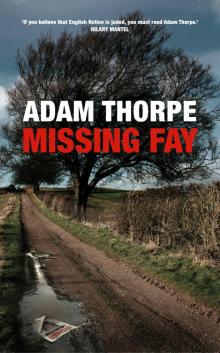 Missing Fay
Missing Fay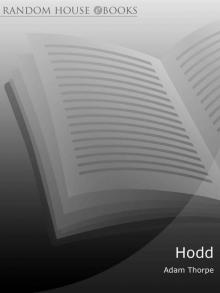 Hodd
Hodd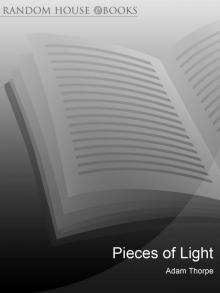 Pieces of Light
Pieces of Light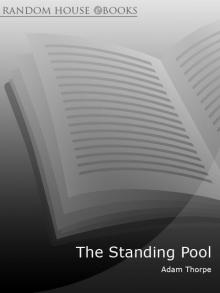 The Standing Pool
The Standing Pool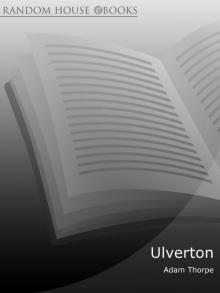 Ulverton
Ulverton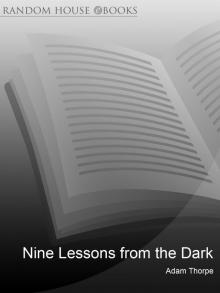 Nine Lessons From the Dark
Nine Lessons From the Dark Flight
Flight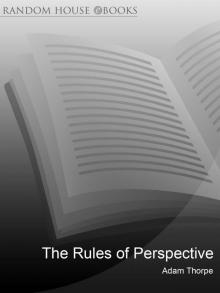 The Rules of Perspective
The Rules of Perspective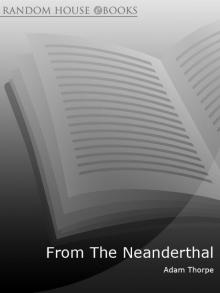 From the Neanderthal
From the Neanderthal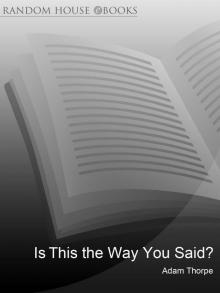 Is This the Way You Said?
Is This the Way You Said?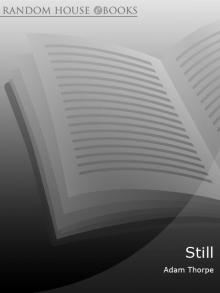 Still
Still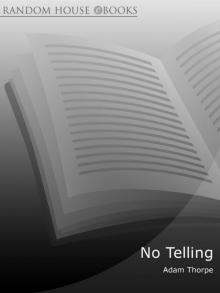 No Telling
No Telling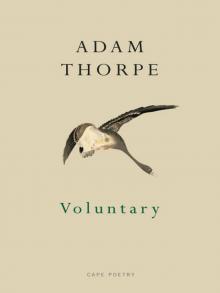 Voluntary
Voluntary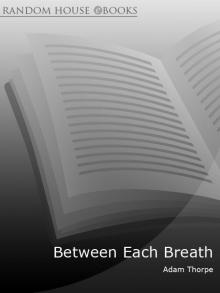 Between Each Breath
Between Each Breath